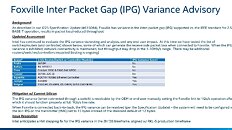- Joined
- Oct 9, 2007
- Messages
- 47,300 (7.52/day)
- Location
- Hyderabad, India
| System Name | RBMK-1000 |
|---|---|
| Processor | AMD Ryzen 7 5700G |
| Motherboard | ASUS ROG Strix B450-E Gaming |
| Cooling | DeepCool Gammax L240 V2 |
| Memory | 2x 8GB G.Skill Sniper X |
| Video Card(s) | Palit GeForce RTX 2080 SUPER GameRock |
| Storage | Western Digital Black NVMe 512GB |
| Display(s) | BenQ 1440p 60 Hz 27-inch |
| Case | Corsair Carbide 100R |
| Audio Device(s) | ASUS SupremeFX S1220A |
| Power Supply | Cooler Master MWE Gold 650W |
| Mouse | ASUS ROG Strix Impact |
| Keyboard | Gamdias Hermes E2 |
| Software | Windows 11 Pro |
Intel's i225 "Foxville" family of 2.5 Gbps wired Ethernet controllers have a design flaw that affects performance, according to an official advisory sent by Intel out to its motherboard- and OEM PC partners (notebook- and pre-built desktop manufacturers). There are no security implications of this advisory. The i225 family of 2.5 GbE chips are being extensively implemented in upcoming motherboard, desktop and notebook designs. The i225 "Foxville" family consists of the i225-V targeted at motherboards and notebooks with Intel chipsets that have integrated MAC; while the slightly pricier i225-LM has an embedded MAC, and targeted at other platforms (extensively found in high-end and upcoming AMD motherboards).
According to the advisory, there is a variance in the inter-packet gap (IPG), the interval between data packets transmitted on the physical layer. This variance can cause packet loss, resulting in reduced throughput (i.e. a performance loss). Interestingly, the IPG variance is seen only when the PHY is networked with select kinds of 2.5 GbE compliant routers and switches. Specific models of Netgear, Juniper, and AQuantia infrastructure chipsets exhibit this variance, while those by Cisco, Huawei, Buffalo, and Aruba, don't. Intel is continuing to re-evaluate the chip with more 2.5 GbE devices, and will update the list in the slide below as needed. There is no mitigation, besides manually setting the controller to work in 1 GbE mode in Intel Network Connections driver control panel. Intel is working on a new stepping of these chips, but those will come out only in the second half of 2020, aligned with "Rocket Lake-S" entering mass-production. This slide inadvertently confirms that its next-generation Core "Rocket Lake-S" processor will enter production in 2H-2020.

"Rocket Lake-S" is a 14 nm silicon that introduces up to 8 "Willow Cove" CPU cores that have higher IPC than both Skylake and Ice Lake (Sunny Cove). It is also expected to feature an updated I/O feature-set, including PCI-Express gen 4.0. This explains how many Intel LGA1200 motherboards we've seen so far feature preparation for PCIe gen 4.0. If "Rocket Lake-S" is indeed coming out before Holiday, "Comet Lake-S" could have a very brief market run spanning barely three quarters.
View at TechPowerUp Main Site
According to the advisory, there is a variance in the inter-packet gap (IPG), the interval between data packets transmitted on the physical layer. This variance can cause packet loss, resulting in reduced throughput (i.e. a performance loss). Interestingly, the IPG variance is seen only when the PHY is networked with select kinds of 2.5 GbE compliant routers and switches. Specific models of Netgear, Juniper, and AQuantia infrastructure chipsets exhibit this variance, while those by Cisco, Huawei, Buffalo, and Aruba, don't. Intel is continuing to re-evaluate the chip with more 2.5 GbE devices, and will update the list in the slide below as needed. There is no mitigation, besides manually setting the controller to work in 1 GbE mode in Intel Network Connections driver control panel. Intel is working on a new stepping of these chips, but those will come out only in the second half of 2020, aligned with "Rocket Lake-S" entering mass-production. This slide inadvertently confirms that its next-generation Core "Rocket Lake-S" processor will enter production in 2H-2020.

"Rocket Lake-S" is a 14 nm silicon that introduces up to 8 "Willow Cove" CPU cores that have higher IPC than both Skylake and Ice Lake (Sunny Cove). It is also expected to feature an updated I/O feature-set, including PCI-Express gen 4.0. This explains how many Intel LGA1200 motherboards we've seen so far feature preparation for PCIe gen 4.0. If "Rocket Lake-S" is indeed coming out before Holiday, "Comet Lake-S" could have a very brief market run spanning barely three quarters.
View at TechPowerUp Main Site




